Heading

Celebrating Helena Modjeska - The 100th anniversary

Celebrating Helena Modjeska - The 100th anniversary
A Film by Basia + Leonard Myszynski
Produced by OC Influential Productions, LLC in association with GetBizzy Entertainment, Inc.
Co-Produced by Sandra Segerstrom Daniels and Thaddeus Kryczko
The film is about conquest. “Attaining the unattainable.” The film takes an in-depth look at the life of the iconic Polish actress Helena Modjeska whose struggles to build a career as an independent female actor and businesswoman, amid confrontations and societal assumptions, becomes a thing of art. Beginning in her native Krakow in mid-nineteenth century, debuting in San Francisco’s California Theatre in 1877 and ending in Newport Beach, where she died in 1909, Helena’s successful 30-year American career as a stage actress crossed cultures, classes and status. She performed in mining towns, Victorian opera houses and theatres across America. As a bi-national star, Modjeska discovered her own natural acting style, refining theatre and redefining culture in America. Continually haunted after visits to her beloved Poland, she transformed herself into the voice of Poland and the voice of women–the dignified, the fallen, and the conflicted. Modjeska's extraordinary vision, creativity and drive became unstoppable.
The stylized film explores the role of the modern woman and the life of an artist missionary. It promotes cultural diversity, advances Polish-American relations and encourages a preservation of the environment and the arts. MODJESKA-WOMAN TRIUMPHANT is the first feature-length documentary made about Modjeska, one of the greatest nineteenth century legends in both Polish and American theatrical history.
Director's Statement
"In my eyes Modjeska was a romantic realist of great power and grace. The film represents this duality: the journey of her soul, her poetic nature and her gentility. The "Arden" within her juxtaposed by a continual drive to move upward and onward. This was symbolized by the movement of the steam engine train, the 'Iron Horse'. There is nothing more sacred to me than nobility and compassion. Modjeska represented both." - Basia
Helena Modjeska was born in Krakow, Poland, on October 12, 1840. She received her only formal education while attending the convent run by the Order of the Presentation Sisters. She was seduced at a young age by one of the family guardians, Gustave Sinnmayer. He later fathered her two children, Rudolph and her daughter Marylka, who died in infancy. As the couple traveled with their acting troupe around the provincial towns of Galicia, Gustave used the stage name “Modrzejewski” while Helena adopted the feminine version “Modrzejewska”. Later, when performing abroad, she anglicized her name to “Modjeska”. Realizing that her impresario could no longer advance her career, Helena left Sinnmayer, taking their son Rudolf, and returned to Krakow. While engaged in the Krakow theatre, she met the Polish nobleman, Karol Bozenta Chlapowski. They married in 1868 and left for Warsaw where she became the most celebrated actress of the Polish national theatre. Her brothers Jozef and Feliks Benda were also respected actors in Poland. The Chlapowski home became the center of the artistic and literary world. Yet, due to the political situation in Poland and its influence on her work, Helena’s life became unbearable.
In 1876, for personal and political reasons, Modjeska and her family emigrated to the United States with a small group of friends. They purchased a ranch in Anaheim, California, forming a Polish colony of intellectuals. The colonists knew very little about farming and the utopian experiment eventually failed. Modjeska returned to the stage, debuting in San Francisco with an English version of Adrienne Lecouvreur and reprising the Shakespearean roles that she had performed in Poland. Despite her accent and imperfect command of English, Modjeska achieved great success in her thirty-year career in the United States and abroad.
Modjeska became known for her support of charitable causes. In 1893 she was invited to speak in a women's conference at the Chicago World's Fair. She described the hardships of Polish women in the Russian and Prussian-ruled parts of Poland. The Russian tsar banned her from traveling or performing in Russian territory. The bi-national star had ignited and influenced the careers of many international artists, such as Sienkiewicz and Paderewski. She advanced and uplifted the profession of acting for women.
On April 8, 1909 Modjeska died in Newport Beach, California. Her remains were sent to Krakow to be buried in the city of her birth at the Rakowicki Cemetery.
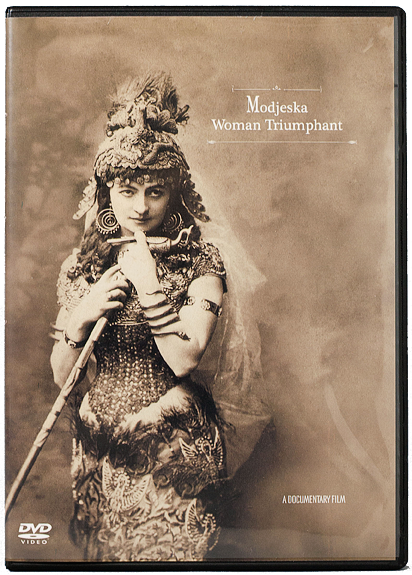
Safe & Secure PayPal Payment
Shipping USA only
It was a six-year journey. No actual footage of Modjeska was ever discovered. Rather than misrepresenting an artist of such caliber or attempting to replicate powerful stage performances that no living person has ever witnessed, Modjeska was "symbolically re-created" through objects of diffusion, such as glass, veils, and elements in nature. Visual composites blended archival imagery with cinematic impressions. Over 75 hours of footage were shot using six different film cameras. Silent film footage and 300 archival photos obtained from sources all over the world were used in the film. During an eight-month post-production period, every photograph was restored and enhanced to unify the film and to match nineteenth century photography and early filmmaking techniques.
Filming involved reenactments and interviews with experts and descendants shot in California, Arizona, Colorado and Poland, from a horse-drawn carriage in Paso Robles to the Tabor Opera House in the mile-high city of Leadville where Modjeska performed, to the dynamic steam train sequences in Durango. The private worlds of Helena were filmed in and around her Santiago Canyon home built in 1988. (Today Arden: Helena Modjeska Historic House and Gardens remains a US National Landmark, currently maintained by the Orange County Parks and supported by the Helena Modjeska Foundation). Descendants living in Arizona and Colorado shared intimate family stories and commentary and access to rare materials, such as Modjeska's original theatrical traveling costume trunks and newspaper articles from this era. Filming on the streets of Krakow, in museum archives of the Stary Teatr, across Polish countrysides and within the catacombs of historical churches gave the film enormous authenticity and threw a unique light on Modjeska's early life and first impressions.
The inner worlds that haunted Modjeska were conveyed through the words written in her own memoirs. The contemporary "Queen of Polish Theatre" Danuta Stenka brilliantly voiced Helena's mixed emotions and psychological dimensions. All voices were recorded in dual language (Polish and English) via studios in Atlanta, Warsaw, London and Burbank. The romantic and poignant music further represented the melancholy nature of Modjeska and her nostalgia for the world she left behind, composed by internationally-acclaimed Mikolai Stroinski during an intense two-week session. The Primetime Emmy and Golden Reel award-winning sound design team of Larry Oatfield + Ewa Sztompke edited dialogue, re-recorded and sound mixed the film at the prestigious post-production house of Skywalker Sound (Nicasio, California) where the film was initially screened in their magnificent 300-seat state-of-the-art Stag Theatre.
One of the greatest challenges for the filmmakers was telling Modjeska's passionate and complex story as simply as possible, in condensed form, and at the same time present an historical context in American settings. The objective was to produce an educational film shown through a diverse lens and representative of this unique artist. Yet it was the in-depth and passionate account provided by cultural historian and Professor and Chair of the Department of Slavic and Eurasian Studies at Duke University Beth Holmgren, who brought it all together. Her expertise unified all the elements of the film and contemporized it for modern audiences. Beth Holmgren is the author of the book Starring Madame Modjeska. To further deepen insights into the life, career and persona of Helena Modjeska, the filmmakers turned to Professor Emil Orzechowski at the Cultural Institute of Jagiellonian University in Poland.
When the film was picked up by PBS SoCal and screened at film festivals and venues across the globe, the filmmakers realized the power of the story. Q&As were enriched by participation of the documentary's performers such as Svetlana Efremova (portraying Modjeska the Actress), family members, sponsors and production creatives engaging audiences in panel discussions. Both Polish and American communities uncovered new insights, historical perspective and immigrant contributions.
Finally, the making of this documentary about a celebrated actor and mother led to the making of the next film about her son, Bridging Urban America - The Story of Ralph Modjeski, another little-known story.
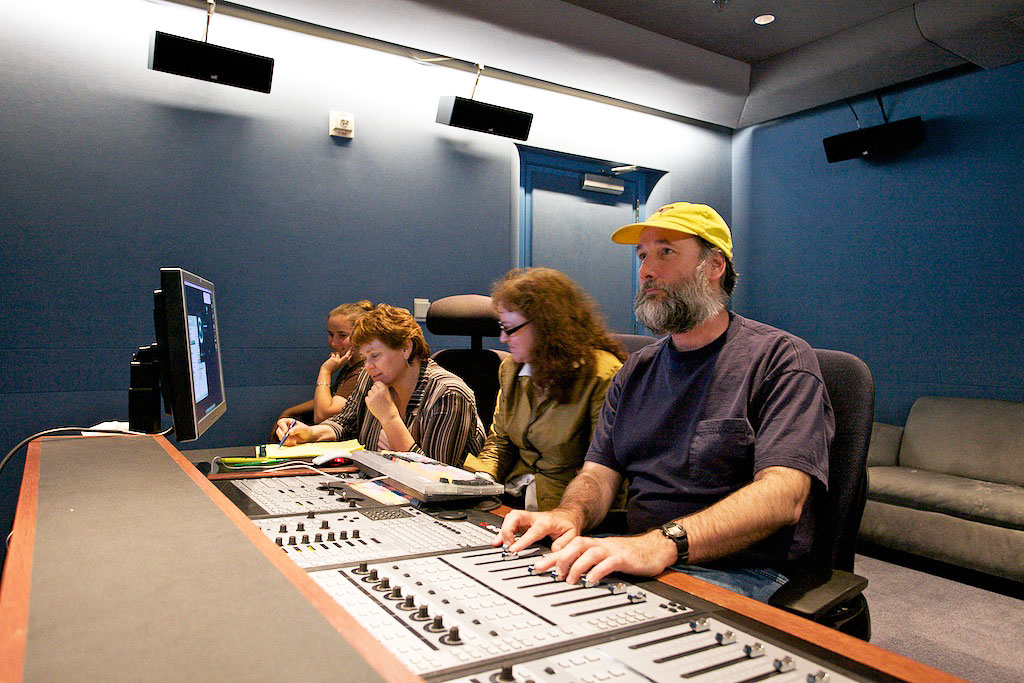
Sound Mix with Re-recording Mixer Larry Oatfield & Dialog Editor Ewa Sztompke with Basia
Skywalker Sound - Nicasio, California
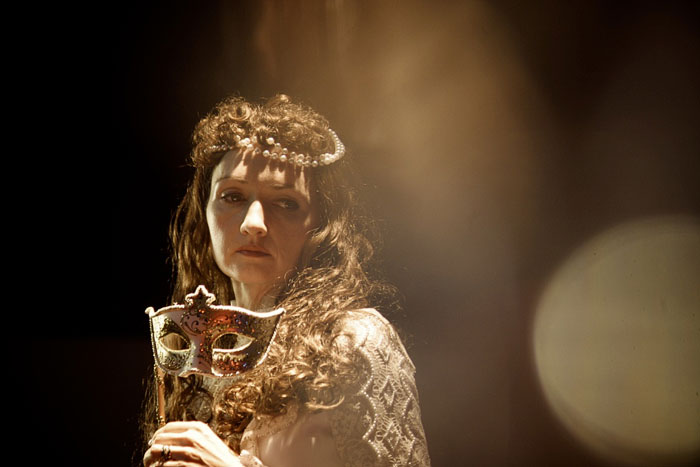
Actress Svetlana Efremova portraying Modjeska as Juliet in Shakespeare's Romeo & Juliet
Orange County Theatre, California
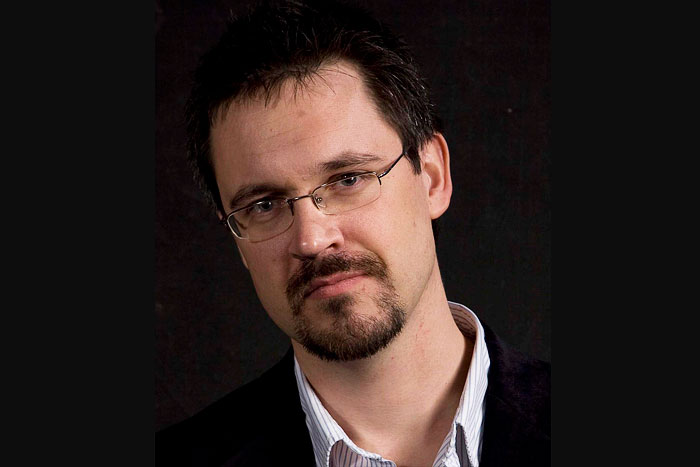
Composer Mikolai Stroinski
Los Angeles, California
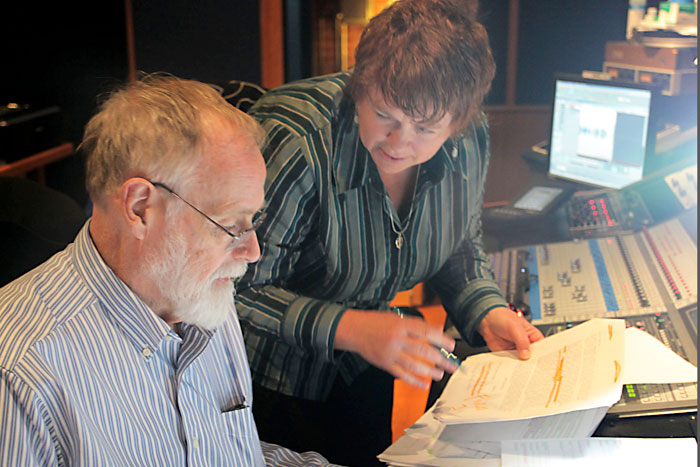
Voice Artist Dudley Knight collaborating with Director prior to recording
Soundworks Studio, Burbank
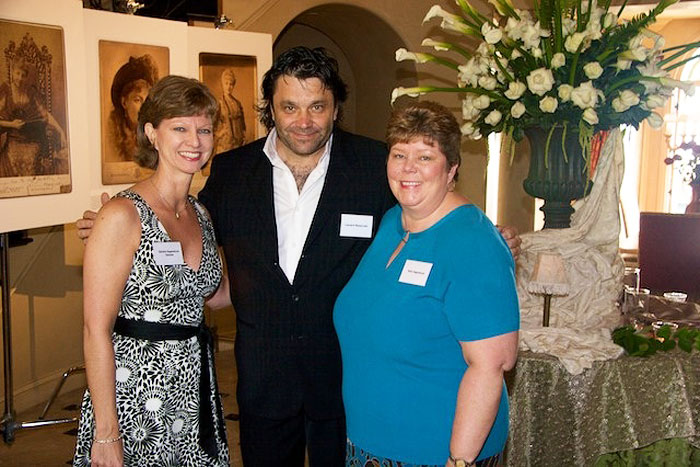
Co-Producer Sandra Segerstrom Daniels with Filmmaker Leonard and Sally Segerstrom at Fundraising Event hosted by Sandra
Newport Beach, California
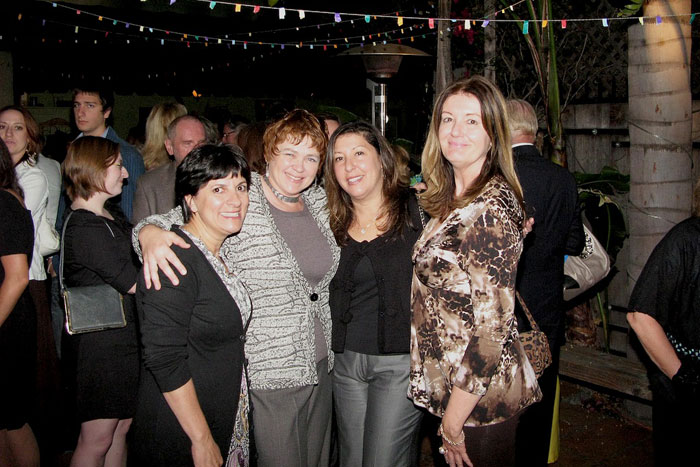
World Premiere After Party crowd with Cindy, Basia, Claudia Puig (President, LA Film Critics Assn) and Tracy
Silent Movie Theatre - Hollywood
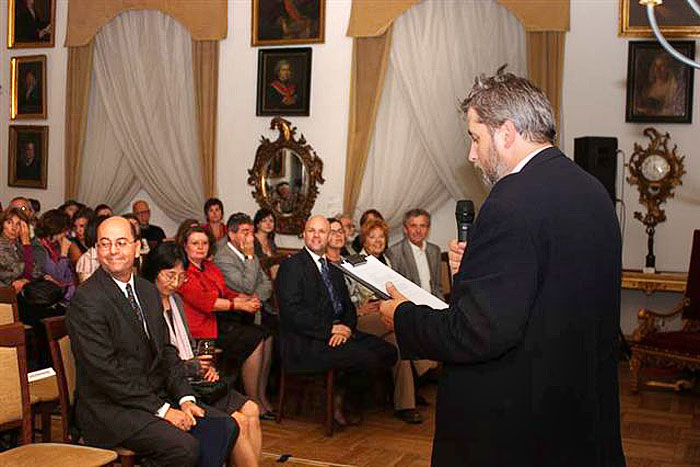
Screening of film in Poland with intro by Museum Director - Attended by United States Consulate General Krakow (left front row) and VIPs - Historical Museum of Krakow
Krakow, Poland
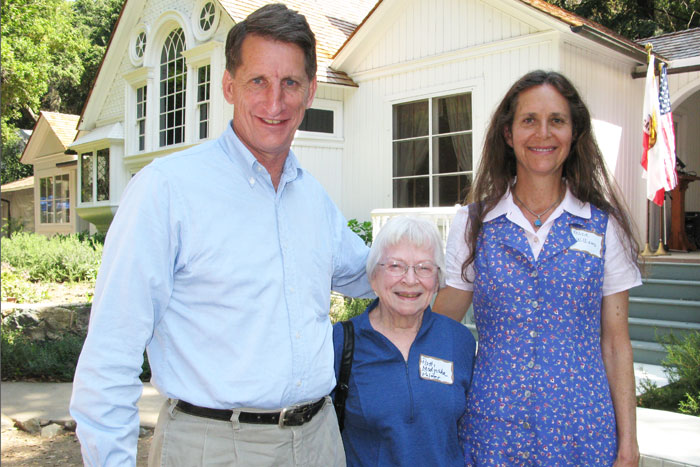
Helena's great-great grandson Ralph Pattison with great-great granddaughter Patti Modjeska Palmer (center) & great-great granddaughter Felicie Williams at Arden celebration
Arden Helena Modjeska Historic House and Gardens - Modjeska Canyon, California
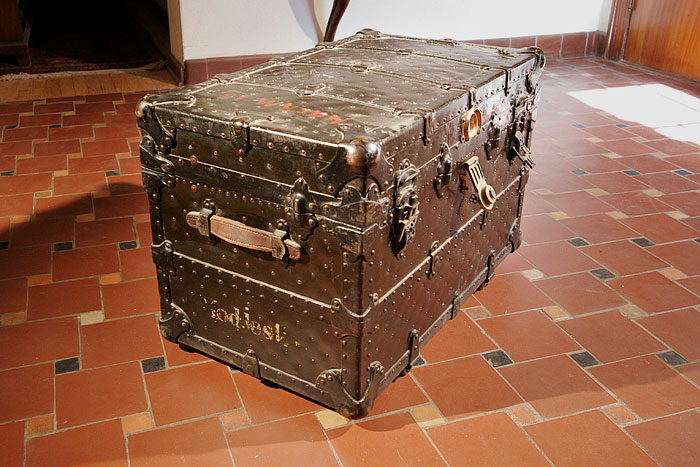
One of Modjeska's 65 original costume trunks traveling with the bi-national star by train from Opera House to Victorian theatres across America - Found in home of descendent Tucson, Arizona
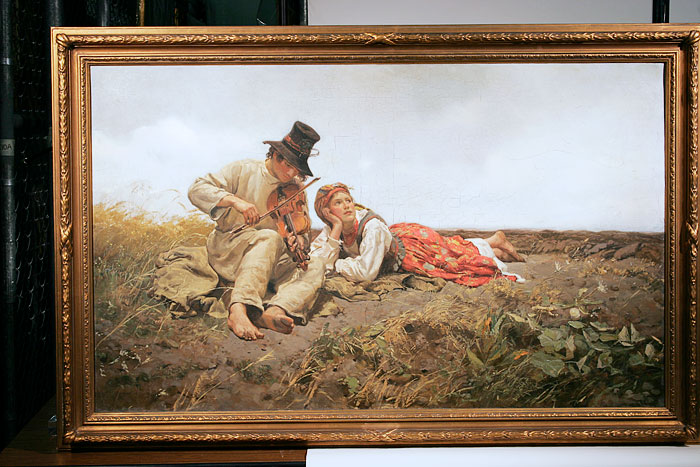
Jozef Chelmonski's painting Sielanka (An Idyll)- Gift to Helena Modjeska by artist for her home in Arden - Exhibited in "For the Love of Art + Science" with Modjeski film screenings
Bowers Museum private collection - Santa Ana, California
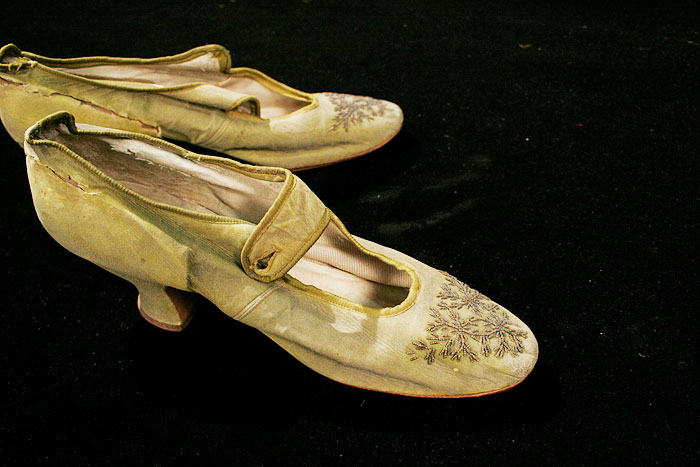
Pair of Helena Modjeska's original gold costume shoes worn in Shakespeare play
Bowers Museum private collection - Santa Ana, California
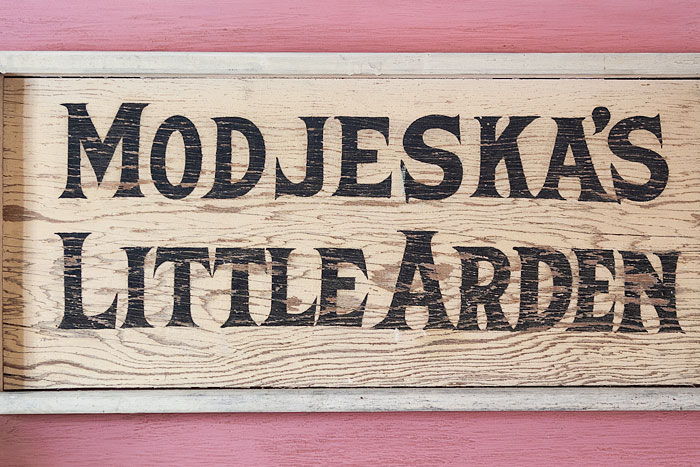
Original sign above the entrance to Helena's final home and resting place overlooking the Pacific Ocean - "Little Arden" would remind her of her Big Arden House nestled in the Saddleback Mountains, named after the Forest of Arden from Shakespeare's "As You Like It"
Bay Island - Newport Beach, California